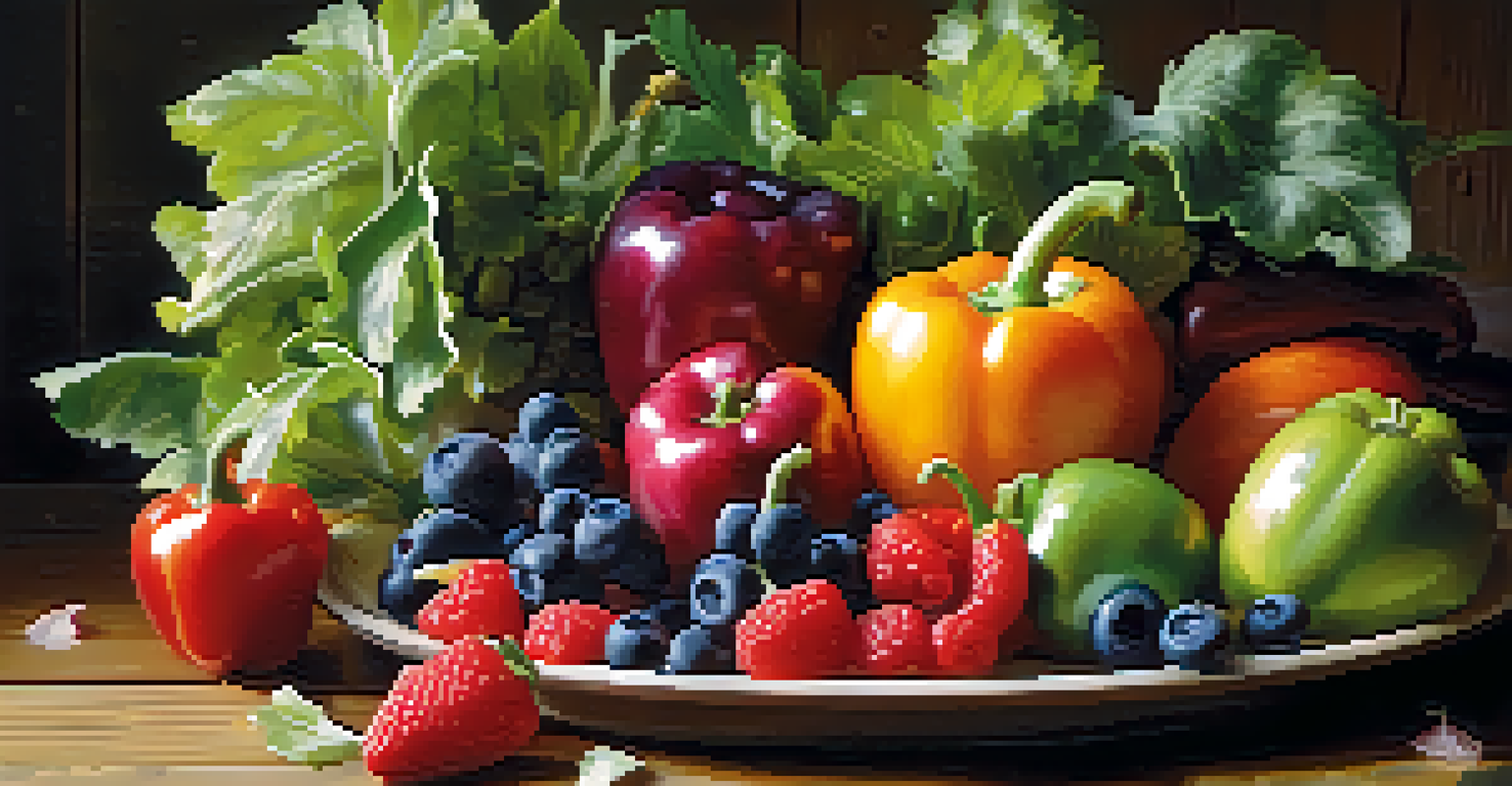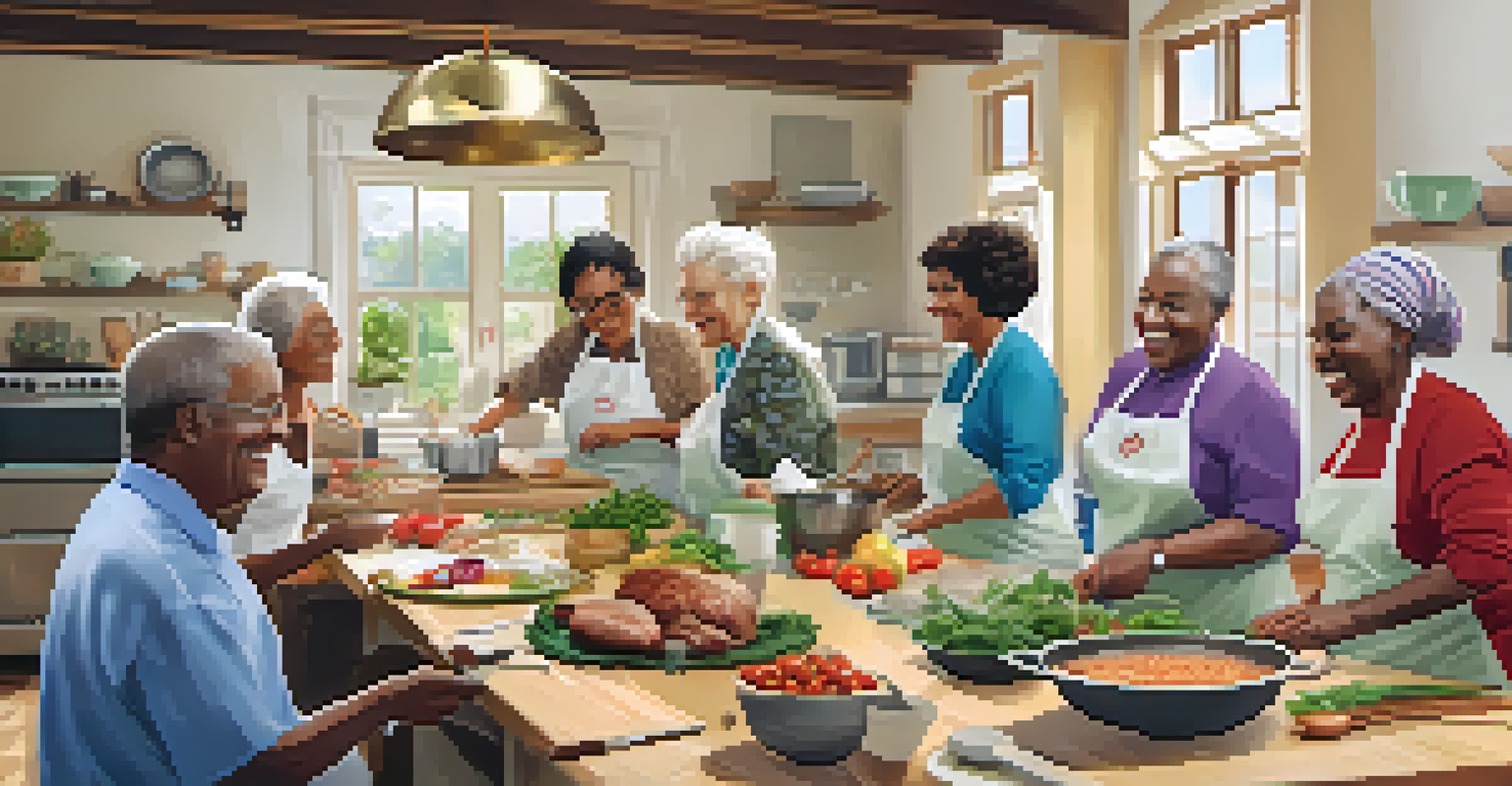Culinary Medicine and Its Impact on Aging Populations

Understanding Culinary Medicine and Its Benefits
Culinary medicine is an innovative approach that combines the art of cooking with the science of nutrition. By focusing on food as medicine, it encourages individuals to make healthier dietary choices that can prevent chronic diseases. This holistic view not only emphasizes the nutritional content of meals but also enhances the enjoyment of cooking and eating, making it a sustainable lifestyle choice.
Let food be thy medicine and medicine be thy food.
For aging populations, this means that the right foods can play a critical role in managing health conditions like diabetes, hypertension, and heart disease. Culinary medicine empowers seniors to take control of their health through informed food choices. By incorporating fresh, whole ingredients into their diets, they can improve their overall well-being and quality of life.
Moreover, culinary medicine promotes social interaction, as cooking and sharing meals with others can foster community and reduce feelings of isolation. This aspect is especially important for older adults, who may face loneliness or depression. Engaging in culinary activities can create a sense of purpose and belonging.
The Role of Nutrition in Healthy Aging
Nutrition plays a pivotal role in the aging process, influencing everything from cognitive function to physical mobility. As we age, our bodies require different nutrients to maintain health and vitality. For instance, adequate protein intake is essential for muscle maintenance, while omega-3 fatty acids support brain health and reduce inflammation.

By understanding the specific nutritional needs of older adults, culinary medicine provides tailored dietary recommendations that can significantly impact their health outcomes. Foods rich in antioxidants, such as fruits and vegetables, can combat oxidative stress, which is linked to various age-related diseases. This allows seniors to not only survive longer but thrive.
Culinary Medicine Combines Food and Health
Culinary medicine merges cooking with nutrition science, encouraging healthier eating habits to prevent chronic diseases.
Incorporating a variety of food groups also ensures that seniors receive a balanced intake of vitamins and minerals. This holistic approach to nutrition helps to mitigate the risks of malnutrition, a common issue among the elderly. Culinary medicine encourages seniors to embrace a colorful plate, which can lead to healthier aging.
Practical Tips for Implementing Culinary Medicine
Implementing culinary medicine doesn’t have to be daunting; it can be as simple as making a few small changes in the kitchen. Start by incorporating more whole foods into your meals, such as whole grains, lean proteins, and a variety of fruits and vegetables. These ingredients can be the building blocks for nutritious and delicious meals that benefit health.
The doctor of the future will no longer treat the human frame with drugs, but rather will cure and prevent disease with nutrition.
Another practical tip is to experiment with herbs and spices instead of relying on salt or sugar for flavor. Not only do they enhance the taste of dishes, but many herbs and spices also possess their own health benefits, like anti-inflammatory properties. This can help reduce the risk of chronic conditions that often accompany aging.
Lastly, consider meal prepping or cooking in batches to ensure that healthy options are always available. This can save time and reduce the temptation to opt for less nutritious convenience foods. By making culinary medicine a part of daily life, seniors can enjoy both the process of cooking and the health benefits it brings.
The Impact of Culinary Medicine on Mental Health
The benefits of culinary medicine extend beyond physical health; it also has a profound impact on mental well-being. Cooking and meal preparation can be therapeutic activities that promote mindfulness and reduce stress. Engaging in these practices allows older adults to focus on the present moment, which can alleviate feelings of anxiety and depression.
Sharing meals with friends or family can further enhance emotional health by fostering connections and creating lasting memories. Social interactions during meals can combat loneliness, a significant concern for aging populations. Culinary medicine encourages gatherings around the table, reinforcing the idea that food is a source of comfort and togetherness.
Nutrition Essential for Aging Well
Proper nutrition is crucial for seniors, as it supports physical health and cognitive function while reducing the risk of malnutrition.
Moreover, learning new recipes or cooking techniques can boost self-esteem and cognitive function. As seniors engage with culinary medicine, they challenge their brains, improving memory and problem-solving skills. This mental engagement is crucial for healthy aging, proving that the connection between food and mental health is vital.
Culinary Medicine and Chronic Disease Prevention
Chronic diseases are a major concern for aging populations, but culinary medicine offers a proactive approach to prevention. By focusing on a nutrient-dense diet, individuals can reduce their risk of developing conditions such as diabetes, heart disease, and obesity. Culinary medicine empowers seniors with the knowledge and skills to make food choices that support their long-term health.
For instance, incorporating whole grains and legumes can help stabilize blood sugar levels, a critical factor for those at risk of diabetes. Similarly, a diet rich in fruits and vegetables can lower blood pressure and improve heart health. These dietary adjustments can have a profound impact on overall health and longevity.
Additionally, culinary medicine emphasizes the importance of portion control and mindful eating practices. By being aware of what they consume, seniors can prevent overeating and maintain a healthy weight. This approach not only improves physical health but also enhances the overall quality of life for older adults.
Building Community Through Culinary Medicine
Culinary medicine serves as a bridge to foster community engagement among aging populations. Cooking classes, workshops, and community gardens can bring people together, creating opportunities for social interaction and shared learning. These activities not only enhance culinary skills but also build relationships and support networks.
Local health organizations and community centers can play a vital role in promoting culinary medicine initiatives. By offering resources and programs tailored to older adults, they can help individuals make informed food choices and improve their cooking skills. This community support can foster a sense of belonging and motivation to adopt healthier lifestyles.
Community Boosts Culinary Engagement
Community initiatives in culinary medicine foster social connections, enhance skills, and promote healthier lifestyles among older adults.
Moreover, community engagement can lead to the sharing of traditional recipes and cultural practices, enriching the culinary experience. This not only preserves cultural heritage but also introduces diverse flavors and ingredients to seniors' diets. Culinary medicine, therefore, becomes a tool for connection and empowerment within communities.
Future Directions for Culinary Medicine in Aging Populations
As the field of culinary medicine continues to evolve, its applications for aging populations are becoming increasingly relevant. Future initiatives may include more personalized nutrition plans that consider individual health conditions and preferences. This tailored approach can enhance the effectiveness of culinary medicine in promoting healthy aging.
Additionally, technology can play a significant role in this evolution. Apps and online platforms can provide resources, recipes, and cooking tutorials specifically designed for seniors. This accessibility can empower older adults to embrace culinary medicine more fully and make informed dietary choices.

Finally, ongoing research into the effects of culinary medicine on aging populations will help to refine best practices and validate its benefits. By understanding the science behind food and health, we can continue to develop effective strategies to improve the lives of seniors through the power of nutrition.